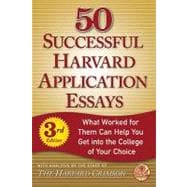
Note: Supplemental materials are not guaranteed with Rental or Used book purchases.
Purchase Benefits
What is included with this book?
| Acknowledgments | p. ix |
| Preface | p. xi |
| Introduction: The Admissions Essay | |
| The Survivor: Overcoming Challenges and Adversity | |
| ôYou Speak Too Fastö | p. 15 |
| ôIts Name Was Wheelie…ö | p. 19 |
| ôStage Frightö | p. 22 |
| ôOvercoming the Fear of Failureö | p. 25 |
| ôMy Lifeö | p. 28 |
| ôNew Kind of Magicö | p. 32 |
| ôThe Freedom to Be Differentö | p. 36 |
| ôThe Brooke Runö | p. 40 |
| ôIn a Pickleö | p. 44 |
| ôUntitledö | p. 48 |
| ôThe Sensitive Itinerant: Changes, Repercussions, and Dealing with Itö | p. 52 |
| One Among Many: Presenting A Unique Applicant | |
| ôSimple Sentencesö | p. 61 |
| ôEndless Forms Most Beautifulö | p. 65 |
| ôThe Space Between the Notesö | p. 68 |
| ôTransnationalism Made Fleshö | p. 71 |
| ôHarvard Supplement Essayö | p. 75 |
| ôJourneys from the Dress-Up Boxö | p. 78 |
| ôWhen I Was Tenö | p. 81 |
| ôBus Window Revelationsö | p. 84 |
| ôCrossing the Rubicon? Child's Playö | p. 87 |
| ôCreativity, Family, and Toilet Paper: A Journeyö | p. 91 |
| ôThe Circle Gameö | p. 95 |
| ôConcerto in C Minorö | p. 98 |
| ôZigguratö | p. 102 |
| ôToddler Coutureö | p. 106 |
| ôStill Lifeö | p. 110 |
| ôUntitledö | p. 114 |
| ôCollege Essayö | p. 118 |
| ôHeadlines, Herodotus…and Full-Field Sprintsö | p. 121 |
| Storyteller: Experiences that Illuminate Character | |
| ôI've Grown Out of Itö | p. 129 |
| ôThe Little Thingsö | p. 133 |
| ôCharlieö | p. 136 |
| ôMusic in the Basementö | p. 140 |
| ôThere Were No Tearsö | p. 144 |
| ôComing Homeö | p. 147 |
| ôA Beach Gameö | p. 151 |
| ôBeauty in a Potbellyö | p. 154 |
| Through Their Eyes: Finding Yourself in Others | |
| ôElephant Daddyö | p. 161 |
| ôRunning with Four Feetö | p. 164 |
| ôFruitful Collisionsö | p. 168 |
| ôDropsö | p. 173 |
| ôMingaö | p. 176 |
| ôThe Journeyö | p. 180 |
| ôGli Strati della Storia (The Layers of History)ö | p. 183 |
| ôUntitledö | p. 187 |
| ôMotherö | p. 191 |
| ôDelve!ö | p. 194 |
| ôA Ride Through the Fieldö | p. 197 |
| ôUntitledö | p. 200 |
| ôMy Motherö | p. 206 |
| Table of Contents provided by Ingram. All Rights Reserved. |
The New copy of this book will include any supplemental materials advertised. Please check the title of the book to determine if it should include any access cards, study guides, lab manuals, CDs, etc.
The Used, Rental and eBook copies of this book are not guaranteed to include any supplemental materials. Typically, only the book itself is included. This is true even if the title states it includes any access cards, study guides, lab manuals, CDs, etc.